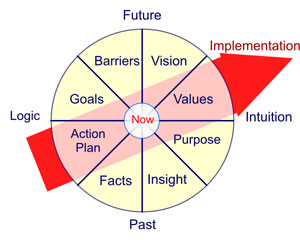How Can I Better Manage Myself?
By Ian Fratarcangeli |
3.6 min read
The last couple years have been nothing short of a rollercoaster. Many now find themselves working from home instead of the office. Whether or not we’re working virtually, everyone has seen a change in their work environment, some more major than others. Changes, for better or worse, have brought immense amounts of stress on people. Some are not confident in their abilities anymore, others doubting if they really belong where they are. Before blaming ourselves or others, we should keep in mind what can be controlled. Managing oneself, in short, is maximizing the things that can be controlled and relieving oneself of what cannot. By asking the important questions, you can have the knowledge to become the most productive and successful version of yourself in the workplace.

What are my strengths?
Nobody can be good at everything. An artist may lack a mathematical mind, while a mathematician may have no artistic ability. It’s up to us to figure out what skills we have and optimize that talent. Feedback analysis has been proven by scientists to be an important process in self-management. Simply recording major decisions you have made and the expected results, then comparing with the actual results months later can help you recognize what decisions you make best. From there, taking the time to embrace your strengths and become an expert in those areas paves the way for long term success. As a company, understanding the need for employees to operate with their strengths to reach their goals will lead to success for both the employee and the company. Leveraging The Predictive Index® allows companies to evaluate employees to identify their optimal work environment and strengths so that their skills can be maximized. A company that invests in developing their employees so they can find their niche is the one that produces the most growth.

How do I operate?
Like one’s strength, everyone has a different way of operating in the workplace. Some thrive off a fast-paced style of work while others prefer ample time to look over and complete assignments. How someone performs is not an indication of their productiveness. However, being forced to change their style of work can lead to a poorer output from the employee. To understand one’s behaviors and needs, taking The Predictive Index Behavioral Assessment™ gives employees, as well as their managers, insight on their optimal environment to perform in. Knowing your best environment allows you to avoid areas of work that would demand change and stick to your strengths, increasing both your productivity and the performance of the company.

What do I value?
We all have values and goals that we should set as our upmost priority. Organizations also have values and goals. As a company works to achieve its goals, an important value for the company should always be the goals of its own employees. Those that do not share the same or close to the same goals as the company will not fit with the organization’s culture, which will only lead to lack of engagement and results. You should work to realize your values and how they tie into both your strengths and the way you perform. Therefore, it is important to first comprehend what you can contribute to the company and what the company can give to you. It is possible that the company’s values don’t align with your own. For example, a company that does not pride itself on investing training for its employees may not share the same goals for the future as you do. There may come a situation where you feel that you must leave a place to find an organization that will be more compatible. Knowing where you belong makes it much easier to align your values so that you can contribute the most you possible can to an organization.
Predictive Success empowers leaders to optimize workforce performance through proven talent management methodologies, high-performing team building technology, and collected employee or potential candidate data. To learn more about how you can work with our team, please contact us today.
Sources:
https://www.glassdoor.com/blog/guide/self-management/
https://hbr.org/2005/01/managing-oneself
Related Blogs
How to Decide Who to Layoff?
How to Decide Who to Layoff? A Strategic Guide Powered by The Predictive Index In uncertain economic climates, tough decisions often become necessary for business continuity. One of the most challenging decisions any organization faces
HR Risk Management – Full Guide
HR Risk Management: A Full Guide with The Predictive Index Advantage In today’s volatile business environment, human capital remains one of the greatest assets—and one of the biggest risks. Organizations are navigating an increasingly complex
9 Tips for Hiring the Best Salesperson
9 Tips for Hiring the Best Salesperson (Backed by The Predictive Index) Hiring the right salesperson can feel like trying to find a needle in a haystack. Sales is a high-stakes role where the right



